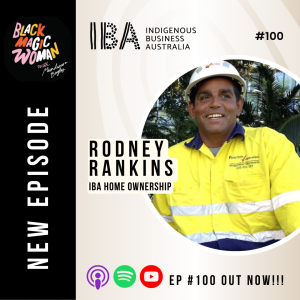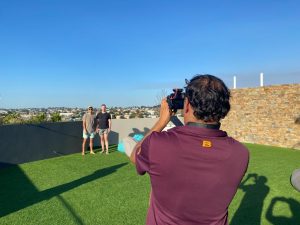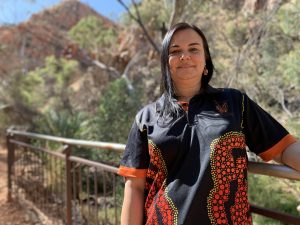INDIGENOUS BUSINESS AUSTRALIA




Episode #100 of Black Magic Woman Podcast is out now. On this episode, Mundanara Bayles yarns with our deadly customer Rodney Rankins and we talk about home ownership!

IBA partnered with the Black Magic Woman Podcast to bring you a series of episodes based on a variety of topics including housing, business, youth, women, investing, financial literacy, economic development and COVID-19 recovery.
We were lucky enough to recently meet Wiradujri man Adam, who shared his home ownership experience with us.

When he first approached IBA for a home loan, he wasn’t in the right financial position to be successful in his application. But instead, he was given advice on how to improve his financial situation and be in a better position to apply down the track.
After months of hard work, paying off debts and saving hard, he and his partner were able to come back to IBA. This time they were approved and bought their dream home.
Adam says, “When I unlock my door every afternoon coming home from work and I walk in and just look, and say ‘this is mine’. It’s overwhelming sometimes.”
After waiting till the time was right, he was in a much better position to start his home ownership journey. We also have workshops and information sessions to help you prepare for home ownership.
The talented filming and editing team at Indigistream helped us put together a video so Adam could share his story and show us his new home.
Watch Adam's story on YouTube or view below:
Vanessa Elliott is a Jaru woman from the Kimberley and desert region. Her bush name is Wunyadee and skin name Nanjilli / Nungaray with strong kinship and cultural connections in WA, NT, SA and QLD. 
She joined the IBA Board in May 2020.
We caught up with Vanessa for a quick yarn to get to know her better.
Why did you join the IBA board? What do you hope to achieve in your time?
I joined the IBA board because time showed me poverty is more than material deprivation; it’s also about structural and systemic exclusion.
So I choose a purpose driven life, to occupy spaces and usher in diversity and inclusion so all First Nations and other displaced peoples can access opportunities and build their own legacy
What do you hope to see happen with Indigenous affairs in the next 5-10 years? 50 years from now?
5-10 years - that our elders live longer and that First Nations’ languages, culture and histories are integrated into corporate Australia, public policy and is seen, heard and valued in our Australian community.
50 years - That our national narrative and policy shifts from colonial and deficit control. Where more First Nations are global citizens with strong cultural identity giving them a unique value proposition and strength to open doors in local and global market place.
Whats your favourite place in Australia and why?
Near a beautiful sunset and the water. When you got culture activated inside you, and great company around you, the creator shows you everyday in the most majestic ways that the best is yet to come.
Where do you feel most connected and why?
To my Jaja’s ( mother’s mother) story and legacy because we spent lots of time together and she taught me the power of now, the purpose of belonging, and the right to own my own destiny.
Which of IBA’s values stands out to you and why? [Respectful, Connected, Informed, Responsive and Invested]
Connected. Connection is the pre-requisite value to achieve the rest.
Is there anything else you would like to share?
It’s time for First Nations to arise and be all that you were predestined to be.
Biripi man Zane Pratt joined IBA as a trainee in 2019 before going full time in 2021 in the Investments & Asset Management team. Zane is also currently the Co-Chair of the Galambany Advisory Committee (IBA’s Aboriginal and Torres Strait Islander staff network) and works on Gadigal land in the Sydney office.

What was your journey? E.g., your studies or/and previous jobs.
I grew up on Dharawal country near Bundeena but eventually moved closer to live on campus in Ultimo while studying business at the University of Technology Sydney (UTS). As part of the Jumbunna Institute for Indigenous Education and research at UTS, I came across an advert for IBA during my 2nd year of university. I ended up joining the IBA finance team as a trainee working a couple of days a week for 18 months or so. After working as a trainee, I decided I wanted to work at IBA full time and was offered a role in the Investments team.
Why is it important for you to work with mob?
Working with mob makes me feel connected and I always want to give back in any way I can. I have been fortunate growing up to have been given so many opportunities to learn and I really want to use that knowledge for positive change amongst community.
I still dedicate some of my time to tutoring at the Jumbunna Institute to share some of the things I’ve learned and encourage other First Nations people to get into this space. I want to be a role model and it’s so important to give back whenever you can.
What is your role within IBA? What is your favourite thing about your role?
I work as an Associate Analyst within the Direct Investments team, which invests back into community. We invest alongside Indigenous organisations in specific assets which generate financial and social returns.
I love working with numbers and knowing that I am doing meaningful things with them. I definitely have a logical brain which is why I’m so drawn to them.
I mentioned previously about wanting to be a role model and how important I think it is to be a role model to community. Indigenous employment in finance is quite low and I feel my job at IBA allows me to be a role model to community and show that there are opportunities for First Nations people in that field.
If you could hang out with anyone dead or alive, who would it be? Why?
It would be between my paternal grandmother since I never got the opportunity to speak with her or Bushrangers Captain Thunderbolt and Mary Ann Bugg, renowned for escaping Cockatoo Island and who I am a descendant of on my mother’s side of the family.
If I did get the chance, I would have a dinner party with all three of them. I believe that would be very interesting.
Where do you feel most connected?
I was born and raised as a Saltwater man and love being anywhere by the sea. I feel most connected to being out and about in the bush around my hometown of Maianbar.
IBA partnered with SBS Small Business Secrets again this year to feature four First Nations businesses doing what they do best. The segments were featured on SBS and NITV, and this was the third year we have supported the production of the series.
SBS produced a special NAIDOC segment that kicked off the week and wrapped it up with Standley Chasm and Amber Days included. Earlier in the year, we had segments on Cooee Cafe and Ngarga Warendj.
This year’s segments were also translated into Mandarin and Spanish as the Department of Foreign Affairs and Trade (DFAT) shared them worldwide through their social channels during NAIDOC week and screened in the DFAT lobby in Canberra.
Check out the full playlist on our YouTube channel or view and read the individual stories below:

Through an IBA partnership with SBS Small Business Secrets, Standley Chasm was featured as part of a NAIDOC Special. The chasm, known traditionally as Angkerle Atwatye, meaning ‘Gap of Water’, brings the red/orange rock of Arrernte country to life.
SBS interviewed Arrernte woman Nova Pomare, who was born and raised nearby and now manages the site.
Thousands of visitors have booked in to experience the chasm this season and learn about the cultural background, but it wasn’t the case for the past couple years through lockdown.
Nova said, “And we are living proof here at Standley Chasm, that despite all the challenges we had, we still stood up and kept doing what we are doing and we're still here standing. And I hope we are good role models for the rest of our mob.”
Nova was approved for an IBA COVID Business Relief Package to get the business through the toughest parts of the last few years. IBA also provided a vehicle lease and funding for a communications tower, essential for running a tourist business in remote areas.
“It is an iconic tourist destination rich in traditional Aboriginal heritage and Nova is a fantastic mentor and trainer for young Indigenous workers, IBA’s Rachel Harding said.
Learn how Nova fought hard to keep this site for mob – something all can be proud of.
Read the SBS article, 'Promoting and protecting Australia's iconic Standley Chasm is a passion for Nova Pomare', or view the NAIDOC Special (link below).

When Melbourne-based designer Corina Muir couldn’t find the right sustainable clothing for her baby daughter, she decided to start her own clothing range, Amber Days – and her Indigenous designs are now in demand worldwide.
The Yorta Yorta and Boonwurrung woman talks about the importance of ethical clothing that is a collaborative effort with other Aboriginal women. She's also now started a pop-up store in Melbourne's North till early August (54 Errol Street).
Corina is all about community and wants her business to be a platform for change. She wants to see First Nation's fashion taken to the wider world. Amber Days was seen on the runway during Melbourne Fashion Week earlier this year.
"Corina had an idea and the passion for her business and she looked to IBA for support to build business acumen and financial literacy skills," said David Deo, IBA's Senior Business Development Officer.
Read the SBS article, 'Corina's sustainable clothing range shares Indigenous culture with the world', or view the video segment that featured as part of an SBS NAIDOC Special on 3 July 2022 (linked below).
Joshua Gilbert is a Worimi man, farmer and academic, from the Mid North Coast of NSW. We are delighted that he joined the IBA Board in April 2022. 
Josh is undertaking higher degree research at Charles Sturt University, is the Indigenous Co-Chair of Reconciliation NSW and was recently recognised within the world’s top 50 young gastronomers. He is an entrepreneur and business advisor, working predominantly in the Aboriginal cultural, agricultural and environmental spheres. He has worked with numerous of not-for-profits, businesses and the government to develop change and bring people on a journey of change.
We caught up with Josh for a quick yarn to get to know him better.
Why did you join the IBA board? What do you hope to achieve in your time? I joined the IBA board as I'm passionate about the opportunities business can provide for mob on the ground, if that's where their passion lies. I also believe home ownership is a pivotal opportunity for mob and want to ensure as many people interested can pursue their dreams of buying a home.
What do you hope to see happen with Indigenous affairs in the next 5-10 years? 50 years from now? I'm particularly interested in what a voice within Parliament will provide for our People, and would love to see this mirrored across Government portfolios- for instance, I'd love to see an Indigenous agricultural advisor to the Minister. I also think a fundamental power shift will take place over the next 50 years, and I'm looking forward to mob self-determining their futures and creating new pathways for youth.
Favourite place in Australia and why? I love being home on country- I think we have the best mix of land from snow to beaches. My other favourite place is on the farm with my Nan- watching her care for the landscape, animals and people, doing what she loves, is a big inspiration for me.
Where do you feel most connected and why? I'm most connected on country- I love the way our small towns come together and connect.
Which of IBA’s values stands out to you and why? Connected- we know all mob are connected and have a yarn about everything and anything. I think our culture, passion and spirits connect us at all times to place and others.

Watch SBS and NITV over the following two weekends to catch two of our customer stories that will feature as part of a NAIDOC special! Standley Chasm and Amber Days will each have a 5-7 minute segment about their businesses and each one includes an interview with an IBA Business Solutions representative.
Lots of opportunities to catch the episodes on air with all timings listed below (all times are AEST):
The short videos were also translated into Mandarin and Spanish as the Department of Foreign Affairs and Trade (DFAT) is sharing them worldwide through their social channels during NAIDOC week, and it will be screened in the DFAT lobby in Canberra.
This special wraps up our 2022 SBS series and is the third year we have partnered with SBS to feature our outstanding business customers. You can catch all the episodes on our YouTube channel and we’ll be re-sharing content on our socials.

The NAIDOC special includes stories on the beautiful tourist destination in Alice Springs called Standley Chasm (known traditionally as Angkerle Atwatye, meaning ‘Gap of Water’) and the ethical clothing designs of Amber Days.
Earlier this year we featured Taungwurrung Kulin man Mick Harding and his art business, Ngarga Warendj (Dancing Wombat), and Yamatji/Noongar woman Sharon Brindley talked about her expanded venture with Cooee Café / JalaJala Treats.
If you want to find out how IBA may be able to support your business idea, find out more.

I joined IBA in 2017 and head up the Strategy and Innovation division within IBA. We coordinate the development of IBA's strategic and corporate plans, report on progress against plans, and undertake research and evaluation to inform innovative policy and strategic directions.
Although we are not a customer facing team we reach across all areas of the organisation and are involved in interesting projects that really focus on challenging the narrative and status quo about what our mob (Aboriginal and Torres Strait Islander people) are capable of. Since joining IBA, our role has evolved and I'm both excited and curious to see where we end up in the next three-five years. Under my leadership we have worked directly with experts who are from our communities to design and launch IBA’s first Impact Framework, Purposeful Partnerships Framework and are embarking on a bold research and policy agenda to accelerate economic empowerment and financial inclusion.
In all honesty, I actually had no intention or interest to work for IBA let alone government. Obviously, our communities and families have had different interactions with Government and subsequently Government policies since colonisation. I was very mindful of joining a system that, on the surface, I didn’t seem to fit and did not want to conform to.
Following some really difficult conversations and decisions, ultimately I felt that being presented with the opportunity to be part of informing and ultimately challenging systemic and structural barriers specific to economic empowerment was where I could be of most use.
What motivates me to keep working here is hope. Hope that change will continue to take place, informed and led by Aboriginal and Torres Strait Islander people.
Hope because in the nearly five years I've been with IBA we can start to say that we know we don’t always get it right and will in all reality continue to get some things wrong. At the end of the day, we are an organisation powered by people and we are all doing the best with what we have right now. When I reflect on my time to date with IBA I am confident that we are making a positive difference and are starting to see the evidence of that through initiatives like our Impact Report and in the way that we define what success looks like beyond standard metrics or KPIs.
For me that is the tip of the iceberg, I know IBA has been challenged by its potential to deliver incredibly positive outcomes whilst working within its legislative framework and upholding the legacy of how IBA came to be. It's important to reflect often on our history as a nation and our history as an organisation, for the time I am at IBA I will continue to remember that we are here for our mob, because of our mob.
If you asked me this question when I joined IBA, it would have a very different answer to now. When I joined, I was really excited about ensuring transparency, clarity and voice through IBA's strategy to life, to be part of implementing the Board's vision and learning (and failing) along the way. I am filled with anticipation about the year ahead and give my gratitude to everyone who has been part of my journey at IBA, those that are still here and those who have left the organisation. Most importantly, I honour those who paved the way for me to contribute in this way.
Thinking about now, I am most proud of being a mum to my two girls, Lila and Naiyah. I am proud to be involved in work that inspires me and challenges me but ultimately is a way of contributing to something so much bigger than myself. I see the work I do at IBA and elsewhere to at least attempt to make the world a more inclusive, equitable experience for my daughters and other Aboriginal and Torres Strait Islander people.
I would rather be in the arena than a spectator, and the act of showing up each day is a quiet demonstration that I'm here and I'm going to give it a go. I want my daughters to know they are worthy, they are valued and the sacrifices of their ancestors and their grandparents is what has made it possible for them to succeed at whatever their dreams may be. I will make sure that as my daughters grow, they see and hear the stories of this amazing community of customers who are proof that anything is possible, whether it’s owning a home, pursuing business ownership or investing in a way that creates greater positive impacts.
One of my all-time favourite songs has to Talkin 'Bout A Revolution by the formidable Tracy Chapman. It is so nostalgic for me because whenever my family and I would drive from Warmun Community (where we grew up in the East Kimberley) to either Broome or Darwin, our mum would always play that in the old cassette player (hahah).
Listening to those words as an Aboriginal child living in remote WA, living on country, being around our old people and also being confronted by social and economic disparity probably explains a lot. I love the rawness and vulnerability but the power and relevance of her lyrics. It always makes me stop whatever I'm doing and close my eyes to think about how important human rights are - which is why I suppose the work I'm privileged to undertake at IBA speaks to me - it is about a revolution, a revolution about ensuring Aboriginal and Torres Strait Islander people are seen for the assets we are rather than some problem to be dealt with.